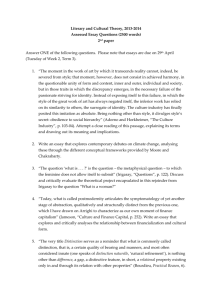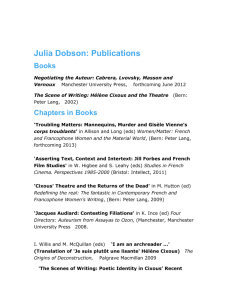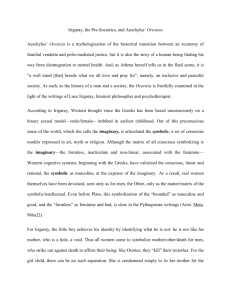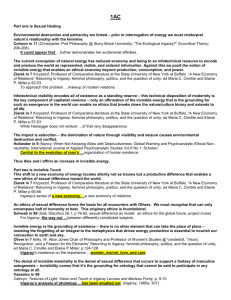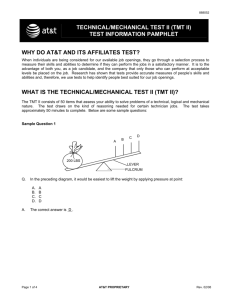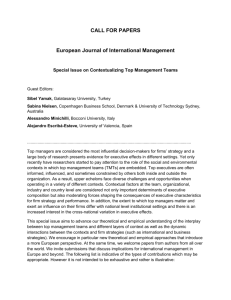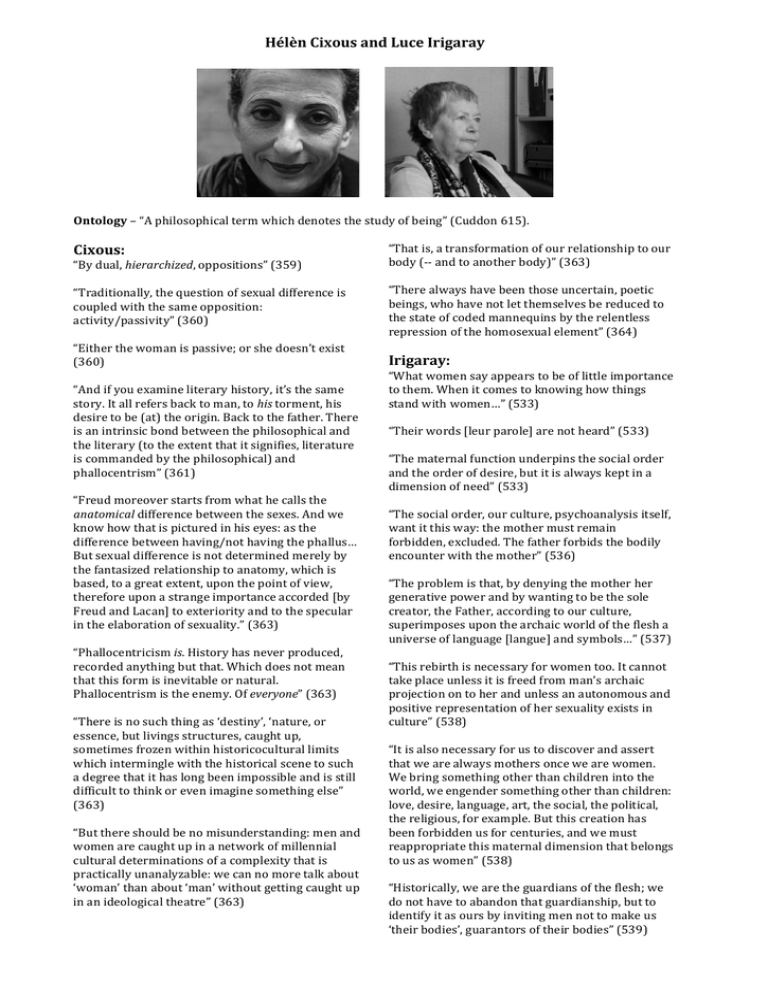
Hélèn Cixous and Luce Irigaray Ontology – “A philosophical term which denotes the study of being” (Cuddon 615). “That is, a transformation of our relationship to our Cixous: body (-­‐-­‐ and to another body)” (363) “By dual, hierarchized, oppositions” (359) “There always have been those uncertain, poetic “Traditionally, the question of sexual difference is beings, who have not let themselves be reduced to coupled with the same opposition: the state of coded mannequins by the relentless activity/passivity” (360) repression of the homosexual element” (364) “Either the woman is passive; or she doesn’t exist Irigaray: (360) “What women say appears to be of little importance “And if you examine literary history, it’s the same to them. When it comes to knowing how things story. It all refers back to man, to his torment, his stand with women…” (533) desire to be (at) the origin. Back to the father. There is an intrinsic bond between the philosophical and “Their words [leur parole] are not heard” (533) the literary (to the extent that it signifies, literature is commanded by the philosophical) and “The maternal function underpins the social order phallocentrism” (361) and the order of desire, but it is always kept in a dimension of need” (533) “Freud moreover starts from what he calls the anatomical difference between the sexes. And we “The social order, our culture, psychoanalysis itself, know how that is pictured in his eyes: as the want it this way: the mother must remain difference between having/not having the phallus… forbidden, excluded. The father forbids the bodily But sexual difference is not determined merely by encounter with the mother” (536) the fantasized relationship to anatomy, which is based, to a great extent, upon the point of view, “The problem is that, by denying the mother her therefore upon a strange importance accorded [by generative power and by wanting to be the sole Freud and Lacan] to exteriority and to the specular creator, the Father, according to our culture, in the elaboration of sexuality.” (363) superimposes upon the archaic world of the flesh a universe of language [langue] and symbols…” (537) “Phallocentricism is. History has never produced, recorded anything but that. Which does not mean “This rebirth is necessary for women too. It cannot that this form is inevitable or natural. take place unless it is freed from man’s archaic Phallocentrism is the enemy. Of everyone” (363) projection on to her and unless an autonomous and positive representation of her sexuality exists in “There is no such thing as ‘destiny’, ‘nature, or culture” (538) essence, but livings structures, caught up, sometimes frozen within historicocultural limits “It is also necessary for us to discover and assert which intermingle with the historical scene to such that we are always mothers once we are women. a degree that it has long been impossible and is still We bring something other than children into the difficult to think or even imagine something else” world, we engender something other than children: (363) love, desire, language, art, the social, the political, the religious, for example. But this creation has “But there should be no misunderstanding: men and been forbidden us for centuries, and we must women are caught up in a network of millennial reappropriate this maternal dimension that belongs cultural determinations of a complexity that is to us as women” (538) practically unanalyzable: we can no more talk about ‘woman’ than about ‘man’ without getting caught up “Historically, we are the guardians of the flesh; we in an ideological theatre” (363) do not have to abandon that guardianship, but to identify it as ours by inviting men not to make us ‘their bodies’, guarantors of their bodies” (539) Questions 1. Luce Irigaray encourages women to “not be the guardians of silence, of a deadly silence” (539). In the light of this view, what is the significance of Aunt Margaret’s lack of voice in The Magic Toyshop (TMT)? 2. Cixous argues, “there “There always have been those uncertain, poetic beings, who have not let themselves be reduced to the state of coded mannequins by the relentless repression of the homosexual element” (364). How might we read this ‘homosexual element’ in TMT? 3. For Irigaray, “The problem is that, by denying the mother her generative power and by wanting to be the sole creator, the Father, according to our culture, superimposes upon the archaic world of the flesh a universe of language (langue) and symbols which cannot take root in it” (537). Who has generative power in TMT? We might also want to think, a little, about ‘flesh’ and ‘language’. 4. According to Cixous, “Phallocentrism is the enemy. Of everyone” (363). How many of Uncle Philip's actions are influenced by Phallocentristic ideas, and in what ways does this contribute to his eventual downfall? Bonus – Why do you think Cixous breaks up her writing in the way that she does (p 359 and 360, as examples)? As in, do you think there is anything to the way that it appears on the page?

